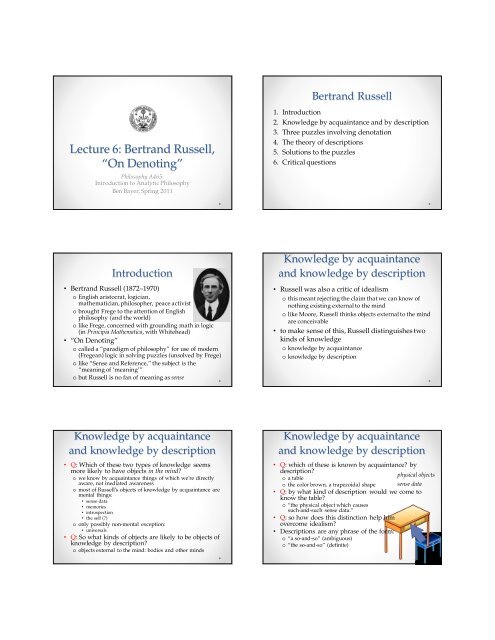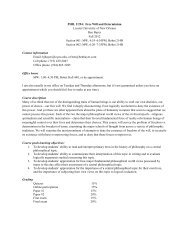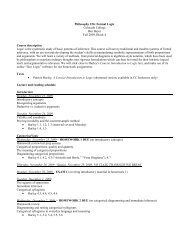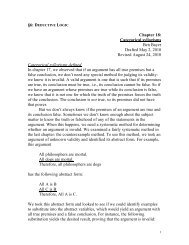Lecture 6: Bertrand Russell, âOn Denotingâ - BenBayer.com
Lecture 6: Bertrand Russell, âOn Denotingâ - BenBayer.com
Lecture 6: Bertrand Russell, âOn Denotingâ - BenBayer.com
You also want an ePaper? Increase the reach of your titles
YUMPU automatically turns print PDFs into web optimized ePapers that Google loves.
<strong>Bertrand</strong> <strong>Russell</strong><br />
<strong>Lecture</strong> 6: <strong>Bertrand</strong> <strong>Russell</strong>,<br />
“On Denoting”<br />
Philosophy A465:<br />
Introduction to Analytic Philosophy<br />
Ben Bayer, Spring 2011<br />
1. Introduction<br />
2. Knowledge by acquaintance and by description<br />
3. Three puzzles involving denotation<br />
4. The theory of descriptions<br />
5. Solutions to the puzzles<br />
6. Critical questions<br />
Introduction<br />
• <strong>Bertrand</strong> <strong>Russell</strong> (1872–1970)<br />
o English aristocrat, logician,<br />
mathematician, philosopher, peace activist<br />
o brought Frege to the attention of English<br />
philosophy (and the world)<br />
o like Frege, concerned with grounding math in logic<br />
(in Principia Mathematica, with Whitehead)<br />
• “On Denoting”<br />
o called a “paradigm of philosophy” for use of modern<br />
(Fregean) logic in solving puzzles (unsolved by Frege)<br />
o like “Sense and Reference,” the subject is the<br />
“meaning of ‘meaning’”<br />
o but <strong>Russell</strong> is no fan of meaning as sense<br />
Knowledge by acquaintance<br />
and knowledge by description<br />
• <strong>Russell</strong> was also a critic of idealism<br />
o this meant rejecting the claim that we can know of<br />
nothing existing external to the mind<br />
o like Moore, <strong>Russell</strong> thinks objects external to the mind<br />
are conceivable<br />
• to make sense of this, <strong>Russell</strong> distinguishes two<br />
kinds of knowledge<br />
o knowledge by acquaintance<br />
o knowledge by description<br />
Knowledge by acquaintance<br />
and knowledge by description<br />
• Q: Which of these two types of knowledge seems<br />
more likely to have objects in the mind<br />
o we know by acquaintance things of which we’re directly<br />
aware, not mediated awareness<br />
o most of <strong>Russell</strong>’s objects of knowledge by acquaintance are<br />
mental things:<br />
• sense data<br />
• memories<br />
• introspection<br />
• the self ()<br />
o only possibly non-mental exception:<br />
• universals<br />
• Q: So what kinds of objects are likely to be objects of<br />
knowledge by description<br />
o objects external to the mind: bodies and other minds<br />
Knowledge by acquaintance<br />
and knowledge by description<br />
• Q: which of these is known by acquaintance by<br />
description<br />
physical objects<br />
o a table<br />
o the color brown, a trapezoidal shape sense data<br />
• Q: by what kind of description would we <strong>com</strong>e to<br />
know the table<br />
o “the physical object which causes<br />
such-and-such sense data.”<br />
• Q: so how does this distinction help him<br />
over<strong>com</strong>e idealism<br />
• Descriptions are any phrase of the form:<br />
o “a so-and-so” (ambiguous)<br />
o “the so-and-so” (definite)
Knowledge by acquaintance<br />
and knowledge by description<br />
• <strong>Russell</strong>: a proper name is often shorthand for a<br />
definite description<br />
o exception: we use a proper name to refer to our self, if we<br />
are directly acquainted with it<br />
ex.<br />
“I, Bismarck, am an astute diplomatist”<br />
“I, , am an astute diplomatist”<br />
o a friend of Bismarck’s is only acquainted<br />
with sense data associated with him<br />
(if not with him directly)<br />
The mustachioed graying man is an astute diplomatist.<br />
o a student of history is only acquainted with testimony:<br />
“The first chancellor of the German empire is an astute diplomatist.”<br />
“The first chancellor of the land of beer and philosophers is an astute<br />
diplomatist.”<br />
ex<br />
ex<br />
Knowledge by acquaintance<br />
and knowledge by description<br />
• this leads <strong>Russell</strong> to a strong claim about meaning:<br />
“<br />
The fundamental principle in the analysis of propositions contained descriptions is<br />
this: Every proposition which we can understand must be <strong>com</strong>posed wholly of constituents<br />
with which we are acquainted.<br />
--<strong>Russell</strong>, “Knowledge by Acquaintance and Description,” p. 5<br />
o this model of analysis will be adopted later by logical<br />
empiricists (positivists)<br />
• Q: what happens if we’re acquainted with the<br />
constituents, but not as going together<br />
o “The just and kind German chancellor who succeeded<br />
Kurt von Schleicher lived a long and happy life.”<br />
• Q: what would Frege say<br />
o The statement has no truth value<br />
o <strong>Russell</strong> will disagree<br />
”<br />
Three puzzles involving<br />
denotation<br />
• Puzzle #1: a problem about identity<br />
o if descriptions denote like names, we should be able to<br />
substitute them for names of equivalent meaning<br />
ex<br />
Scott is the author of Waverley<br />
George IV wonders if Scott is the author of Waverley.<br />
George IV wonders if Scott is Scott.<br />
TRUE<br />
FALSE<br />
o but we can’t, so why not<br />
• Q: Which other puzzle does this remind you of<br />
o Frege’s puzzle about belief<br />
o but <strong>Russell</strong> doesn’t like Frege’s solution appealing to sense<br />
o <strong>Russell</strong>: do descriptions denote like names<br />
Three puzzles involving<br />
denotation<br />
• Puzzle #2: a problem about sentences with non-referring<br />
terms<br />
o by the law of the excluded middle:<br />
• either A is B, or A is not B<br />
ex<br />
So either<br />
The present King of France is bald.<br />
or<br />
The present King of France is not bald<br />
should be true<br />
o but if we examine all the bald and non-bald things,<br />
we find no present King of France<br />
o neither statement appears to be true, even though one should be<br />
• Q: What was Frege’s solution to this problem:<br />
o a concession, they’re both neither true nor false<br />
o but <strong>Russell</strong> is convinced that every sentence is either true or false:<br />
how might these be<br />
Three puzzles involving<br />
denotation<br />
• Puzzle #3: a problem about negative existentials<br />
o if descriptions denote like names, they should denote something<br />
real<br />
ex<br />
“It’s false that A differs from B.”<br />
“The difference between A and B does not exist.”<br />
These are no different from:<br />
“The present King of France does not exist.”<br />
“Santa Claus does not exist.”<br />
o but if a term is non-denoting, how can it be used to deny the<br />
existence of anything<br />
o if the term does denote, then what it denotes is said not to exist,<br />
so it doesn’t denote: that’s a contradiction!<br />
• Q: How did Frege solve this problem<br />
o said that negative existentials are not about referents, but sense:<br />
ex<br />
“The present King of France” does not refer.<br />
The theory of descriptions<br />
• We need an analysis of definition descriptions<br />
o but his method of analysis is different than usual<br />
• Q: Normally, if you analyze the concept “king,”<br />
what can you do with a sentence using it<br />
ex<br />
Louis is [king].<br />
An analysis of “king” should yield something substitutable for that term:<br />
Louis is a [ male aristocratic head of state ].<br />
• Q: Can you do the same kind of analysis for<br />
grammatical particles<br />
ex<br />
[If] Louis is King, [then] Louis is an aristocrat.<br />
The best you can do is to translate this into a whole other sentence:<br />
Louis is King, or Louis not an aristocrat.<br />
o this is analysis by contextual definition
The theory of descriptions<br />
• <strong>Russell</strong>’s contextual definition of definite<br />
descriptions:<br />
ex<br />
The Prince of Wales is large-eared.<br />
means the same as<br />
1. There is a Prince of Wales.<br />
2. A Prince of Wales is large-eared<br />
3. One and only one Prince of Wales is large-eared.<br />
• But this analysis won’t help unless it’s presented<br />
in a more formal, rigorous notation<br />
ex<br />
The Prince of Wales is large-eared.<br />
means the same as<br />
x [Px & Lx & y(Py → x=y) ]<br />
The theory of descriptions<br />
• Updated symbolic logical notation:<br />
• Predicates<br />
• A, B, F ( is an apple, is a banana, is a fruit)<br />
• Terms<br />
• Variables: x, y, z,<br />
• Names: a, b, c<br />
• Atomic formulas: Ax, Ab, Bxy, Bcd<br />
• Complex formulas:<br />
Where φ is an atomic formula, a <strong>com</strong>plex formula can be:<br />
~ φ (φ ψ) (φ & ψ) (φ ψ) (φ ↔ ψ)<br />
• Complex formulas involving variables:<br />
x (Ax) [“” is an “existential quantifier”]<br />
x (Ax) [“” is a “universal quantifier”]<br />
• A sentence is a formula with no free variables:<br />
Ab Bcd x Ax y (By Fy)<br />
• Sentences involving and are intertranslatable:<br />
x (Ax) :: ~x (~Ax) x (Ax) :: ~ x (~Ax)<br />
The theory of descriptions<br />
• How this relates to <strong>Russell</strong>’s older notation:<br />
C(everything)<br />
means<br />
‘C(x) is always true’<br />
(x) Cx<br />
C(nothing)<br />
means<br />
‘”C(x) is false’” is always true’<br />
(x) (~Cx)<br />
C(something)<br />
means<br />
‘It is false that “C(x) is false” is always true<br />
‘C(x) is not always false’ ~(x) (~Cx) ::<br />
x (Cx )<br />
15<br />
The theory of descriptions<br />
• Descriptions analyzed in logical notation<br />
ex<br />
The Prince of Wales is large-eared.<br />
means the same as<br />
1. There is a Prince of Wales.<br />
x (Px)<br />
There is an x, such that x is a Prince of Wales<br />
2. A Prince of Wales is large-eared<br />
x (Px) & (Lx)<br />
There is an x, such that x is a Prince of Wales and x is large-eared.<br />
3. One and only one Prince of Wales is large-eared.<br />
x [(Px) & (Lx) & y(Py → x=y) ]<br />
There is an x, such that x is a Prince of Wales, x is large-eared, and<br />
if any other y is a Prince of Wales, then y is x.<br />
The Theory of Descriptions<br />
• Q: What is wrong with the following way of<br />
representing the same description<br />
ex<br />
x (Px) & (Lx) & y(Py) → x=y<br />
<strong>com</strong>pared to the original:<br />
x [(Px) & (Lx) & y(Py → x=y) ]<br />
o the missing parentheses are an important omission:<br />
• without the parentheses, Lx is not bound to a quantifier<br />
• without the parentheses, x=y is not bound to any quantifiers<br />
• without the parentheses, we don’t know if any of the x’s are<br />
the same<br />
o the extent of the parentheses defines the scope of the<br />
operator, in this case the x<br />
17<br />
Solutions to the puzzles<br />
• Puzzle #2: a problem about sentences with nonreferring<br />
terms<br />
ex<br />
Either<br />
(1) The present King of France is bald or<br />
(2) The present King of France is not bald<br />
should be true<br />
o but neither seems to be true: why<br />
• <strong>Russell</strong>: analyze “the present King of France is<br />
bald”<br />
• Q: is “the present King of France” a name<br />
ex<br />
Bp<br />
x [(Kx) & (Bx) & y(Ky → x=y) ]<br />
o no: a denoting phrase is not independently<br />
meaningful, only contextually
Solutions to the puzzles<br />
• Q: How would you express that (1) is false with the<br />
same notation<br />
ex<br />
(1) The present King of France is bald.<br />
x [(Kx) & (Bx) & y(Ky → x=y) ]<br />
FALSE<br />
There is an x such that x is a King of France, x is bald, and if any<br />
y is a King of France, then x is y.<br />
(2) The present King of France is not bald.<br />
x [(Kx) & (~Bx) & y(Ky → x=y) ]<br />
FALSE<br />
There is an x such that x is a King of France, x is not bald, and if<br />
any y is a King of France, then x is y.<br />
(3) It’s not the case that the present King of France is bald.<br />
~ x [(Kx) & (~Bx) & y(Ky → x=y) ]<br />
TRUE!!<br />
It’s not the case that there is an x such that x is a King of France, x is<br />
bald, and if any y is a King of France, then x is y.<br />
• So “Either the present King of France is bald, or the<br />
present King of France is bald” is true<br />
o provided that we mean “Either (1) or (3)” is true<br />
Solutions to the puzzles<br />
• Puzzle #3: a problem about negative existentials<br />
ex<br />
The present King of France does not exist.<br />
Santa Claus does not exist.<br />
o How can we deny the existence of anything<br />
• <strong>Russell</strong>: analyze “The present King of France<br />
exists”<br />
• Q: is this the correct way to assert existence<br />
ex<br />
A present King of France exists.<br />
x (Kx & Ex)<br />
o no!: existence claims are made with the “x” operator,<br />
not with predicates.<br />
o existence is not a predicate<br />
Solutions to the puzzles<br />
• Q: Simplify: how do we analyze “a present King<br />
of France exists”<br />
ex<br />
A present King of France exists<br />
x (Kx)<br />
The present King of France exists.<br />
x [(Kx) & y(Ky → x=y) ]<br />
(There is an x such that x is a King of France, and if any y is a King of<br />
France, x is y)<br />
• Q: So how is existence denied<br />
ex<br />
A present King of France does not exist.<br />
~ x (Kx)<br />
It’s not the case that there is an x such that x is a King of France.<br />
~ x [(Kx) & y(Ky → x=y) ]<br />
It’s not the case that there is an x such that x is a King of France, and<br />
if any y is a King of France, x is y.<br />
Solutions to the puzzles<br />
• Q: Does this kind of denial involve any terms<br />
that denote non-existing objects<br />
ex<br />
~ x (Kx)<br />
(It’s not the case that there is an x such that x is a King of France)<br />
~ x (Kfx )<br />
(It’s not the case that there is an x such that x is a King of f.)<br />
• Q: Suppose this statement is false: why does it<br />
not involve the suspected contradiction<br />
ex<br />
Santa Claus exists.<br />
x (Sx )<br />
FALSE<br />
“Santa Claus” is not really a name, but means an associated definite description:<br />
The man who lives at the North Pole and who brings presents to all the<br />
world’s good little boys and girls on Christmas exists.<br />
x [(Mx & Nx & Pbgcx) & y(My & Ny & Pbgcy → x=y) ]<br />
~ x [(Mx & Nx & Pbgcx) & y(My & Ny & Pbgcy → x=y) ] TRUE<br />
Solutions to the puzzles<br />
• Puzzle #1: a puzzle about identity<br />
ex<br />
Scott is the author of Waverley<br />
(1) George IV wonders if Scott is the author of Waverley.<br />
(2) George IV wonders if Scott is Scott.<br />
TRUE<br />
FALSE<br />
o why is (1) true but (2) is false<br />
• <strong>Russell</strong>: analyze “Scott is the author of Waverley”<br />
o suppose “Scott” is a regular name (maybe we’re Scott)<br />
o suppose we treat identity like a predicate<br />
o suppose Ax = “x is an author of Waverley”<br />
ex<br />
Scott is the author of Waverley<br />
x [(Ax) & y(Ay → x=y) & (x = Scott)]<br />
Solutions to the puzzles<br />
• So how does George IV wonder about this<br />
o suppose we leave “George IV wonders” unanalyzed<br />
ex<br />
George IV wonders whether Scott is the author of Waverley<br />
This can be translated one of two ways:<br />
Primary occurrence of “the author of Waverley”<br />
(1) x [(Ax) & y(Ay → x=y) & George IV wonders whether (x =<br />
Scott)]<br />
Secondary occurrence of “the author of Waverley”<br />
(2) George IV wonders whether x [(Ax) & y(Ay → x=y) & (x =<br />
Scott)]<br />
o in neither (1) nor (2) does George IV wonder whether Scott<br />
= Scott, but whether x = Scott.<br />
o there is no single denoting phrase “the author of<br />
Waverley” to equate with “Scott”






